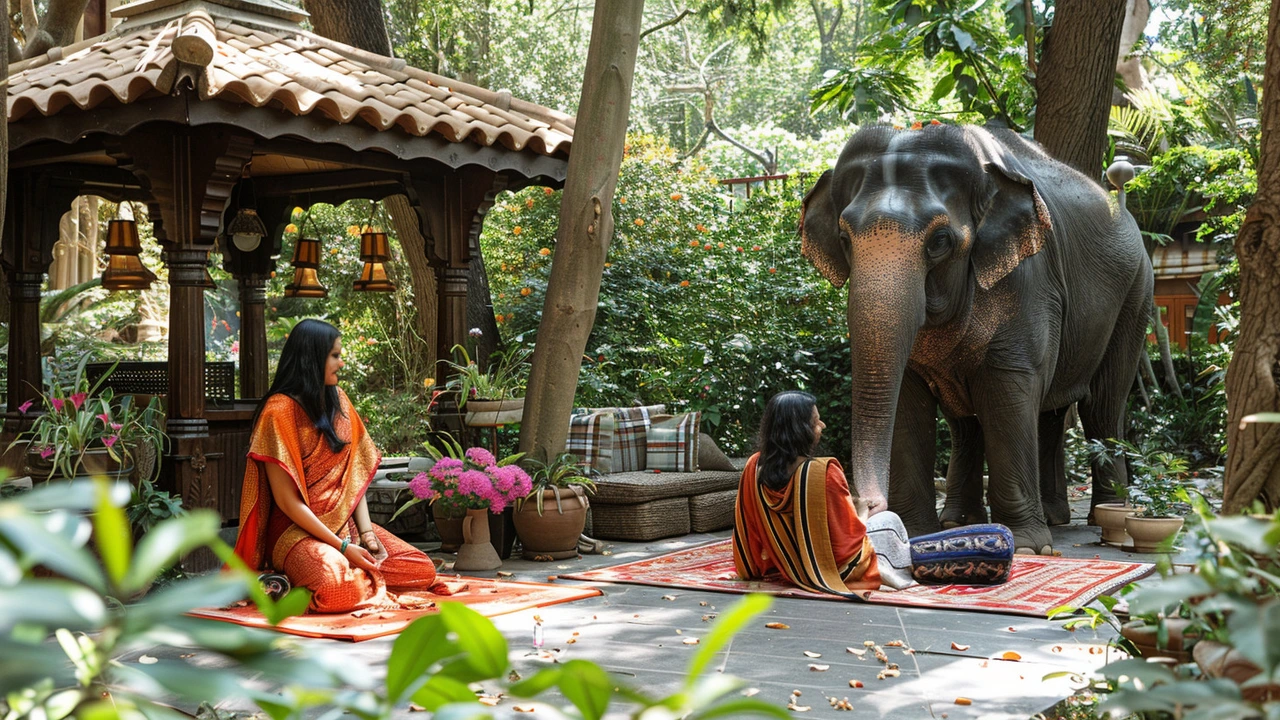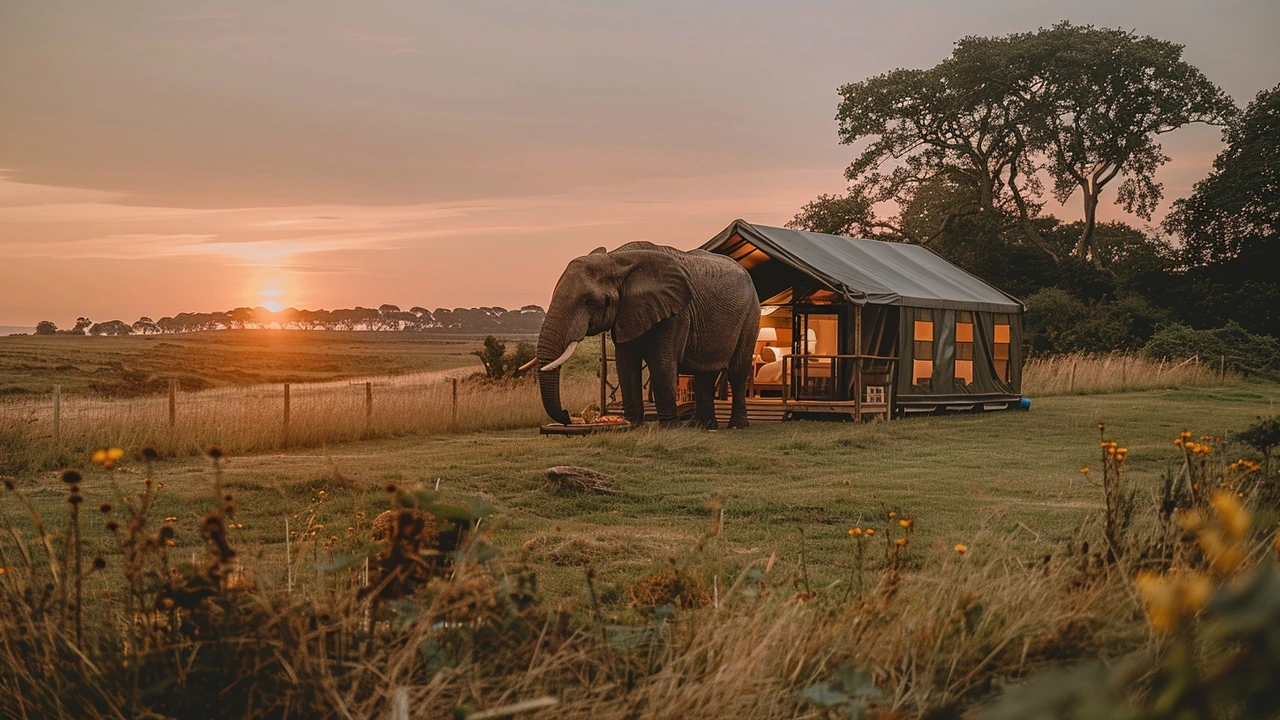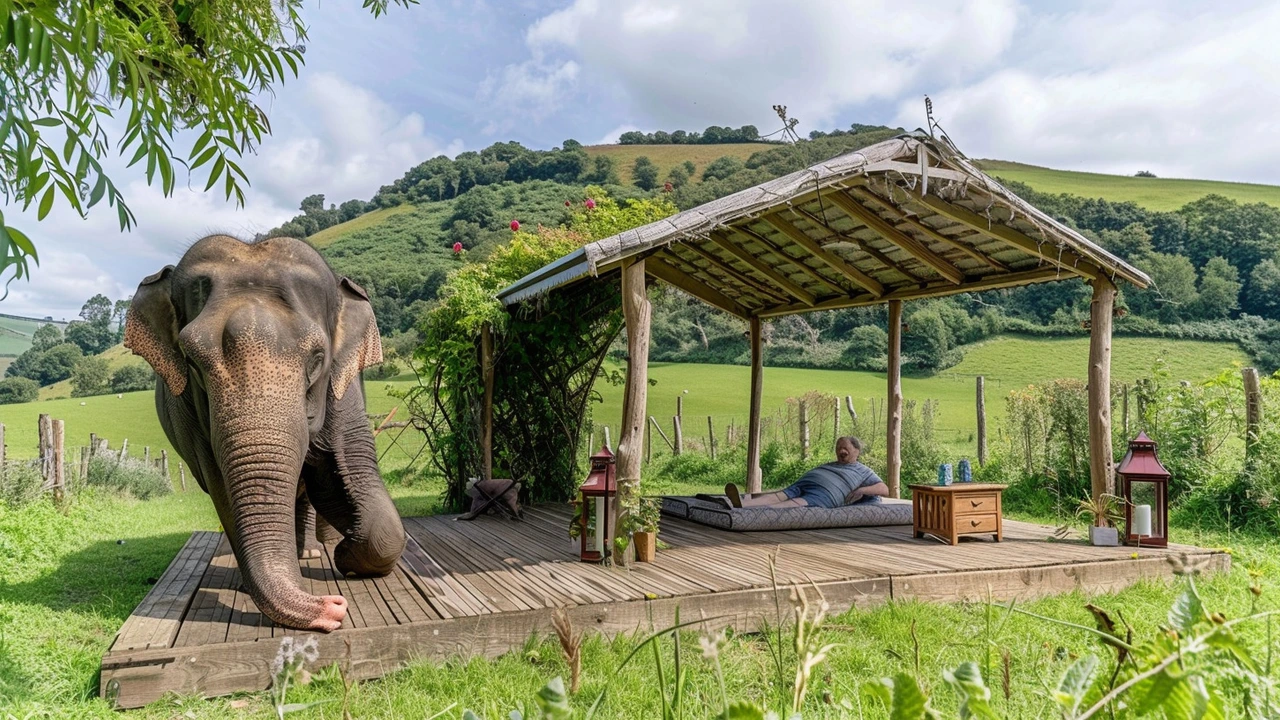Elephant Massage: Discovering the Ultimate Relaxation Technique

Picture this: a serene setting in the heart of nature, the calm presence of a majestic elephant, and the unexpected yet soothing experience of an elephant massage. For those curious about unique relaxation methods, elephant massage offers a fascinating blend of nature and therapy.
Elephant massage isn't just about the novelty of it; it’s an age-old practice deeply rooted in tradition and wellness. This guide aims to provide an in-depth look into the world of elephant massages, shedding light on its origins, techniques, and the numerous benefits it brings to the table.
- Introduction to Elephant Massage
- History and Cultural Significance
- How Elephant Massage Works
- Health Benefits
- Safety and Ethical Considerations
- Tips for Your Elephant Massage Experience
Introduction to Elephant Massage
The concept of elephant massage might sound unconventional, but it's an extraordinary practice that has captured the fascination of wellness enthusiasts worldwide. Imagine the gentle caress of an elephant's trunk, as this massive yet remarkably delicate creature provides a massage that can awaken a sense of deep relaxation and connection with nature. Originating in Southeast Asia, elephant massage is more than just a quirky experience; it's a tradition steeped in local culture and healing practices.
Historically, elephants have played vital roles in many Asian cultures, not just as labor animals but as symbols of wisdom and strength. The idea of using elephants for massage likely developed from the intimate relationships handlers, known as mahouts, formed with these gentle giants. Over time, mahouts observed the therapeutic effects of an elephant's touch on themselves and on their animals. These observations evolved into a structured practice that offers both physical and mental healing benefits.
In Thailand, one of the places where elephant massage is most popular, elephants are treated with great respect. It’s not uncommon to hear local stories of elephants who seem to instinctively know where a person is experiencing pain or tension. This incredible sensitivity is attributed to the elephant's highly developed sense of touch and their unique ability to communicate through their trunks. Modern wellness centers in Thailand often incorporate elephant massages as part of a holistic health package that includes yoga, meditation, and herbal treatments.
An elephant's trunk is known for its versatility. It contains over 40,000 muscles, allowing it to execute precise movements. During a massage, an elephant will use its trunk to gently knead and press muscles, mimicking some of the techniques used by human therapists. One might be surprised by how light an elephant's touch can be, given their size. The soft, rhythmic pressure applied by the trunk can help relieve tension, improve circulation, and reduce stress levels.
One of the most fascinating aspects of elephant massage is its impact on the mind. Being in the presence of such a majestic animal can be an awe-inspiring experience that promotes mindfulness and emotional well-being. There's a special bond that forms during the session, providing a unique sense of peace and calm that is hard to achieve in more conventional settings. According to one massage therapist who works with elephants, "The energy exchange between the elephant and the person they are massaging is something magical. It's a profound experience that goes beyond physical relaxation."
Despite its many benefits, it’s crucial to approach elephant massage with a clear understanding of ethical considerations. Not all elephant massage centers adhere to humane and ethical treatment standards. Enthusiasts should seek out reputable facilities committed to the welfare of the animals, where elephants are treated with kindness and respect. It's essential to do thorough research and choose centers that prioritize the elephants' well-being over commercial gain.
History and Cultural Significance
Elephant massage might appear as a contemporary trend in the wellness sector, but its roots run deep into history. In many Asian cultures, elephants have always held a place of great respect and reverence. Particularly, in countries like Thailand, India, and Myanmar, elephants are not only viewed as symbolically important but also as vital companions in everyday life.
Traditionally, elephants were integrated into various aspects of rural and ceremonial life. These majestic creatures were often regarded as harbingers of luck and prosperity. Temples and festivals frequently featured elephants, highlighting their esteemed status in society. With their gentle demeanor and strong familial bonds, elephants became a representation of loyalty, patience, and wisdom.
The practice of using elephants for massaging is believed to have originated in Thailand. Here, elephants were trained in the art of touch therapy by their mahouts (handlers). The method involved the elephants using their trunks and sometimes even their feet to stroke and knead the human body, similar to how they might groom themselves or show affection within their herd. The mahouts would harness the natural strength and sensitivity of these animals to offer a unique form of therapy.
A notable aspect of the historical context is the relationship between the mahout and the elephant. This bond, often starting from the birth of the elephant, is characterized by mutual respect and understanding. Over time, the mahout teaches the elephant how to use its trunk and feet gently, ensuring no harm comes to the person receiving the massage. This process, by some accounts, can take several years to perfect.
The cultural significance extends beyond massage. Elephants are deeply woven into the fabric of these communities. They participate in religious ceremonies, lead parades, and even play a role in agricultural activities. Their involvement in massage therapy is just one of the myriad ways elephants contribute to human life.
It's worth noting that not all elephant massages are created equal. Ethical considerations are paramount in maintaining the well-being of these animals. The growing awareness around animal rights has led to stricter regulations and practices, ensuring that both the elephants and the people involved in this practice benefit positively. As with any emerging wellness trend, it's essential to approach elephant massage with respect for its historical roots and cultural significance.
"Elephants are not just animals; they are a vital part of our cultural heritage and carry centuries-old wisdom and traditions," says cultural historian Dr. Aruna Singh.
The integration of elephant massage into modern wellness practices showcases a beautiful blend of tradition and contemporary health benefits, making it a fascinating subject for enthusiasts and newcomers alike.

How Elephant Massage Works
At first glance, the concept of an elephant massage might sound like something from a fairytale, but it is a real and enriching experience that has won the hearts of wellness seekers. Elephant massage taps into the profound connection between humans and elephants, harnessing the gentle strength of these creatures to provide therapeutic benefits. Here's how this unique process works its magic.
Elephant massage involves the trained elephant using its trunk and feet to apply pressure and strokes on the human body. The trunk, an incredibly versatile appendage, performs gentle manipulations that can range from light, soothing strokes to deeper, muscle-reaching massages. The firmness can be adjusted based on the individual's preference, ensuring a personalized experience. Elephants are trained with the utmost care, preserving both their well-being and that of the human participants.
Training and Bonding
The training process for an elephant to administer a massage is intricate and compassionate. It involves positive reinforcement techniques where the elephant is rewarded for performing the right actions. This not only conditions them to perform the massage but also fosters a bond of trust and respect between the animal and its trainer. During the massage, the calm and affectionate demeanor of the elephant creates a relaxing atmosphere for the individual receiving the massage.
“Elephants have an exceptional ability to sense human emotions. This makes them perfect partners in providing a relaxing massage experience,” says Dr. Samantha Lee, a renowned animal behaviorist.
It’s not just the trunk that does the work; the elephant's feet play a crucial role too. Known for their gentle strength, the padded feet can knead muscles and relieve tension effectively. The tactile sensitivity of an elephant’s feet allows them to gauge the right amount of pressure needed, avoiding any discomfort.
Customized Techniques
An elephant massage session is usually customized to meet individual needs. Typically, the session begins with the human lying on a cushioned mat in a serene outdoor setting. Often accompanied by the soothing sounds of nature, the elephant, under the guidance of its mahout (trainer), begins the massage.
Instructions from the mahout guide the elephant through a series of movements. The session may include:
- Light Trunk Strokes: Gentle caresses of the trunk that help ease superficial discomfort.
- Deep Muscle Kneading: Using the trunk for deeper pressure to alleviate muscle pain.
- Padded Foot Massage: Elephant uses its feet to provide a comforting, rhythmic pressure.
An interesting aspect of elephant massages is the unique application of pressure by the elephant’s trunk and feet. Unlike human masseurs who might rely on strength and technique, elephants use their natural, gentle weight to apply gradual pressure that penetrates deep into the muscles without causing pain.
Healthcare Benefits
Receiving a massage from an elephant comes with a variety of health benefits. The deep pressure therapy is known to stimulate blood circulation, reduce stress hormones, and improve overall muscle relaxation. For individuals suffering from chronic pain or tension, the unique pressure points targeted by the elephant's trunk and feet provide effective relief.
Another notable benefit is the mental and emotional relaxation the presence of the elephant induces. The sheer size and calm demeanor of these gentle giants can make the individual feel secure and at peace, enriching the massage experience tenfold.
In essence, an elephant massage goes beyond the scope of traditional massages. The interaction with such majestic creatures offers not just physical respite but a soulful connection with nature, enhancing both body and mind. The seamless combination of skillful technique and gentle bonding makes it a cherished and transformative experience for massage enthusiasts.
Health Benefits
Elephant massage isn't just a curious novelty; it offers numerous health benefits that might just surprise you. Firstly, the sheer size and gentle touch of an elephant can provide a unique and deeply relaxing experience. The pressure exerted by an elephant's trunk or foot can release tension knotted deep within your muscles, potentially offering relief from chronic pain conditions such as fibromyalgia and sciatica.
The application of broad, steady pressure helps in improving blood circulation throughout the body. Enhanced circulation means that more oxygen and nutrients reach your tissues and organs, which can aid in faster recovery from injuries and better overall health. Those who have experienced elephant massages frequently report feeling a sense of calm that goes beyond ordinary massages. This tranquil state is likely due to the slow, rhythmic movements and the comforting presence of the elephant itself.
Another significant benefit is the stimulation of the lymphatic system. The gentle kneading and compressions help to stimulate lymphatic drainage, which can boost the immune system and promote detoxification. This can be particularly beneficial for individuals who suffer from edema or chronic fatigue syndrome.
Stress reduction is one of the most sought-after benefits of any massage, and elephant massage excels in this area. The immersive natural environment, combined with the experience of connecting with an elephant, often leaves participants with a profound sense of peacefulness and mental clarity.
Dr. Jonathan Smith, a leading expert in animal-assisted therapy, once noted, "Being in the presence of such large yet gentle creatures can remind us of the beauty and simplicity of nature, which inherently reduces our stress levels."
There is also an element of emotional healing involved. Elephants are known for their strong bonds and social connections, and their empathetic nature can have a healing effect on human emotions. Many people find that interacting with elephants during a massage helps them reconnect with their inner selves, promoting emotional well-being and balance.
In addition to emotional and physical benefits, there's also evidence suggesting that spending time with elephants can have mental health perks. Engaging with these giants can help reduce symptoms of depression and anxiety, giving people a fresh perspective on their mental health challenges. The novelty and sheer joy of the experience can work wonders in alleviating a moody mind.
For athletes, an elephant massage can contribute to muscle recovery and flexibility. The deep tissue massage targets specific muscle groups, aiding in the removal of toxins produced during intense workouts. This results in quicker muscle recovery and increased flexibility, which is essential for both amateur and professional athletes who want to maintain peak performance.
From improved blood circulation and lymphatic drainage to significant stress reduction and emotional healing, elephant massage offers a range of health benefits. The unique combination of physical and emotional perks makes it a compelling choice for anyone looking to enhance their well-being in an extraordinary way.

Safety and Ethical Considerations
When it comes to enjoying an elephant massage, there's a lot more to consider than just the relaxation benefits. Ensuring both the safety of the participants and the ethical treatment of the elephants is paramount. These magnificent creatures, known for their intelligence and gentle nature, deserve profound respect and care.
Firstly, it's important to only participate in programs where elephants are treated with utmost respect. This means avoiding any establishment where the animals are housed in poor conditions, forced to perform tricks, or mistreated in any way. Ethical elephant sanctuaries are often ones that prioritize the animals' well-being, providing them with ample space to roam, proper nutrition, and veterinary care.
“The welfare of elephants must come before tourism. A responsible approach ensures that these gentle giants are not exploited but instead are part of conservation efforts,” says Dr. Janine Carter, a wildlife conservation expert.Researching the background of the sanctuary or wellness center offering elephant massages can provide insight into their ethical practices. Look for reviews, certifications, and affiliations with wildlife protection organizations. This due diligence ensures that your experience contributes positively to the animals' lives.
Safety is another major concern, both for the participants and the elephants. Proper protocols must be followed to ensure that neither party is harmed. Only trained mahouts (elephant handlers) should guide the sessions, understanding the behaviors and body language of the elephants. Participants should also be briefed on how to act around these large animals, avoiding sudden movements or loud noises that could startle them.
Another significant aspect revolves around the health of the elephants. They should not be overworked or stressed, and sessions should be limited to a manageable number each day. Understanding and respecting the physical limitations and psychological needs of elephants is crucial to their well-being. Regular health check-ups by veterinarians are a must to monitor any potential issues and ensure the elephants are in good condition.
An interesting fact to note is that elephants have highly sensitive skin. They can feel even the lightest touch, so it's essential that any interaction, including massages, involves gentle and careful movements. This sensitivity is why they can offer such nuanced and effective massages, but it also means they can easily be hurt if not handled properly.
In summary, ensuring a safe and ethical elephant massage experience means putting the animals' needs and welfare first. It's about participating in programs that respect these majestic beings and understanding the importance of their physical and psychological health. By supporting ethical practices, enthusiasts can enjoy a unique wellness experience while contributing to the conservation and care of these wonderful creatures.
Tips for Your Elephant Massage Experience
Embarking on an elephant massage experience can be both exciting and nerve-wracking. To ensure you have a memorable and relaxing session, there's a few things to keep in mind. Here are some useful tips to make the most of your time with these gentle giants.
First and foremost, do your research. Not every place that offers elephant massages is reputable. Look for facilities that prioritize elephant welfare and have positive reviews from other visitors. Ethical treatment of elephants should be your top priority. Choosing a well-reviewed facility can make a significant difference in both your experience and the wellbeing of the elephants. The Tourism Authority of Thailand, for instance, highlights the importance of ethical activities involving elephants, ensuring these amazing creatures are cared for properly.
Next, understand the importance of bonding with the elephant you'll be interacting with. Spend some time around the elephant before the massage begins. This bonding time can help both you and the elephant feel more comfortable. Engage with the elephant by feeding it or simply by being in its presence. This helps develop a trust bond, which is crucial for a successful massage session. Remember, elephants are incredibly social animals and can sense your feelings.
Make sure to wear comfortable clothing. Loose, breathable fabrics are best since you'll be in close contact with the elephant and possibly in a natural outdoor setting. Avoid any accessories that could poke or scratch the elephant during your session. It’s not just about your comfort, but also about ensuring the elephant isn’t inconvenienced or hurt in any way.
Prepare to be patient and open-minded. Elephant massages are quite different from human massages and can feel unusual at first. Elephants use their trunks and feet to apply pressure, which can sometimes be surprising. Let go of any expectations and embrace the unique experience. If at any moment you feel uncomfortable, communicate gently with the handler. They're there to ensure both the safety of you and the elephant.
Additionally, respect the elephant's boundaries. Elephants are immensely intelligent creatures, and they have their own personalities and preferences. If an elephant seems disinterested or needs a break, be respectful and give it time. Pushing an animal beyond its comfort zone is never a good idea. A reputable handler will always prioritize the elephant’s comfort over the session’s duration or intensity.
Lastly, cherish the experience. An elephant massage is not just about the physical relaxation, but also about connecting with nature in a unique way. Take a moment to absorb your surroundings, listen to the sounds of nature, and appreciate the majestic being in front of you. This mindfulness can make the experience more fulfilling and memorable.
“In the end, we will conserve only what we love; we will love only what we understand, and we will understand only what we are taught.” - Baba Dioum
Taking the time to prepare and approach your elephant massage with these tips in mind can greatly enhance your experience. You’ll not only walk away feeling relaxed but with a deeper appreciation for these magnificent creatures and the connection you’ve fostered with them.





